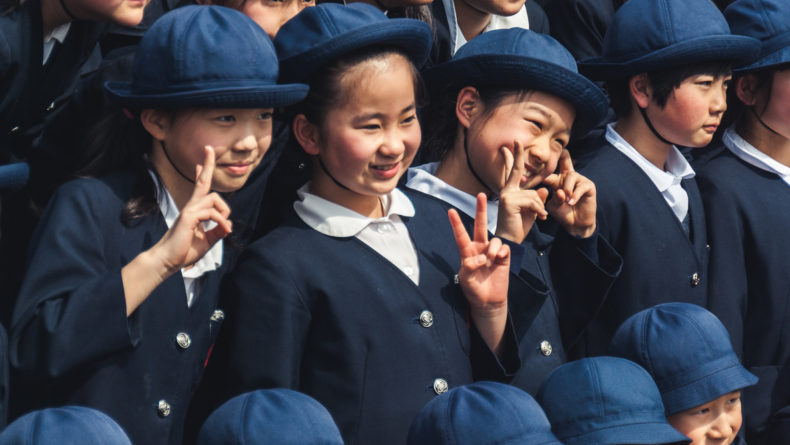Been There, Learnt That: Raising Kids As An International Couple In Japan
A Foreign Mom, A Japanese Dad, And Three Kids
One family’s journey of coming to terms with cultural differences and finding common grounds in successfully raising three children in Japan.
It was an average school day in our Tokyo bed town, but the Kittaka kids were heading off to Disneyland. A good friend from overseas was in town on a flying business trip, and she had set the day aside to meet me. When she revealed that she wanted to visit the Magic Kingdom, I was thrilled — and even happier when she said, “And you must bring the kids!” All this had to be kept a secret from Daddy, however, as he wouldn’t have approved of the older two missing a day of school for Disneyland. Like many Japanese people, my husband follows rules, while I think that occasional bending of rules isn’t necessarily a bad thing — and that applies to parenting, too.
There are certain perennial questions that people always ask international couples in Japan. “Where did you guys meet?” usually tops the list, but chances are you’ve also been asked, “So, what do you two fight about?” Thinking back to the very early days of my marriage with my Japanese husband, most arguments were related to quite mundane themes: whose credit card bill was too large, who didn’t clean up their dirty dishes, why did he turn on the TV and fell asleep on the couch immediately after, or why did I decorated — once again — our tiny apartment with scores of knick-knacks. Of course, cross-cultural issues did come up on occasion, but most of our disagreements were about things that any couple could relate to. Until we became parents.
Becoming parents
Fast-forward a few years, however, and the stakes had been raised—we were now parents. While unique aspects of pregnancy and giving birth in Japan merit a whole separate article, the needs of small babies are universal—eat, diaper change, cuddle, nap, rinse and repeat. However, as the baby grows, topics such as language, education, daily routines, discipline and even holidays can all be potential breeding grounds for parental dissent.
Like many Japanese people, my husband follows rules, while I think that occasional bending of rules isn’t necessarily a bad thing.
I had mostly been happy to follow the “Japanese way” of doing things until that point, but after becoming a parent, I found my own cultural values becoming much more important.

Our family about 13 years ago.
Where’s my husband? Expectations vs. Reality
For many foreign women married to Japanese men, one of the biggest bugbears is that we hardly see our husbands on a given weekday (and not always at weekends, either!). My own mother was a stay-at-home mom but even so, my father was always home by 6 to have dinner with us, then to help with dishes, homework and the bedtime routine. I can count on the fingers of one hand the times my own husband was home to help put our kids to bed.
The typical Japanese “salaryman” hours don’t mesh too well with many foreign women’s idea of what constitutes a balanced family life. While it’s true that Japanese women have made strides in the workforce in the last few decades, things haven’t really changed regarding attitudes to family life and child raising. The “typical” two-parent family model in Japan is for the man to work and the woman to handle the household and the kids, whether she works outside the home or not.
Given this situation, what can a wife do? You can complain to your partner about it, as I did frequently when the children were smaller. However, this only led to arguments and resentment at home. From his point of view, my husband was also working very hard to further his career for our sakes. Gradually I learned to grit my teeth and just get on with things, juggling my own work and three kids and the household as a solo act. In return for expecting little input from my husband during the week, however, I insisted that weekends were for family time (when he wasn’t on a business trip). In that respect, he tried to step up and do things together as a family.
‘Hun, where’s the daycare?’: The consequences of being absent
Because it was usually (ok, always) me dealing with daycare, school, extra-curricular activities and PTA stuff, I naturally became the default expert on all things kid-related. This grated on me more than my husband probably realized. One Monday morning when our girls were five and two, I asked him to drop them off at daycare when I had a very early appointment.
In return for expecting little input from my husband during the week, however, I insisted that weekends were for family time.
I helpfully lined up all the daycare paraphernalia that came home each weekend—one set for each little girl, by the door. All he had to do was grab and go. As soon as our son left for elementary school, I went to the entrance to put on my shoes. “Wait!” called my husband with a sheepish grin. “Um…I don’t actually remember where the daycare is.” He seemed to think it was rather funny. I had to swallow the less than kind words that sprung to my lips!
Education matters
The flipside of being the “expert” on all kid-related things is that I had carte blanche with decisions on how we educated them. This seems to be one area where some internationals couples disagree, but not us. My husband is the product of the Japanese public education system all the way from daycare to college, but he grew up in an entirely different era, as well as a different area of Japan. Being Japanese didn’t really help much when it came to navigating modern-day education in Tokyo, and once I realized he was as clueless as me, I took the reins. Of course, I asked for his input after doing my research, but we never had disagreements about educational choices.
Irritations and cultural values
Cultural values can affect the way we deal with our kids. It is well known that Japan is a group-oriented society, when you generally try not to stick out too much. My husband used to get very stressed out and embarrassed if the kids behaved badly when we were out. While they could be rambunctious, our oldest and youngest were generally easy-going. It was typically our middle child who left Daddy mortified whenever she had a meltdown in public.
Our little drama queen could throw a tantrum at the drop of the hat. Her behavior certainly didn’t thrill me either, but I spent much more time around the kids so I was used to it. At times it seemed that he cared more about what complete strangers might be thinking than anything else! Conversely, if our daughter acted out at home, he usually did his best to ignore it and let me handle things.
My husband used to get very stressed out and embarrassed if the kids behaved badly when we were out.
This lack of consistency, as I saw it, was a bone of contention at times. Thinking back to my own childhood, my parents always put on a united front whenever my brother and I were in trouble. When I broached the subject with my husband, he admitted that he spent so little time around the kids anyway, he didn’t really want to play the heavy at home if possible.
However, when it came to what he considered major breaches of decent behavior, such as shirking one’s load or sibling altercations resulting in bodily harm, I could rely on my husband to jump in. Then he could reduce the little culprit(s)to tears with a few choice words delivered in a thunderous tone.

Holidays call for important decisions
Even a joyful occasion like Christmas can turn sour when expectations are different. Japanese kids typically get just one “Santa gift” on Christmas Day but make up for it a week later with lots of otoshidama (New Year’s gift money) from relatives. With one set of relatives overseas and the other halfway across the country, our kids didn’t do very well in the otoshidama stakes. My husband used to remark that I was “spoiling” them because they got several gifts apiece at Christmas, even when those gifts included simple things like pajamas, stationary and chocolate.
If your mom isn’t Japanese, Santa leaves you extra presents!
Eventually, however, he grew to accept this version of Christmas that worked for our family, just as I had to accept that it was all up to me to “produce” the holiday. (He did at least help to gift wrap.) As for our kids, they used to tell their friends, “If your mom isn’t Japanese, Santa leaves you extra presents!”
It’s been a few years since anybody in our family believed in Santa, but just as our family’s two cultures have blended over the years into a unique celebration, my husband and I are united in our pride at seeing how our kids have grown into their bicultural heritage. As the holiday season rolls around again and we look forward to having our trio home for the (southern hemisphere) school summer vacations, that’s our biggest gift.
What are some of the issues in your family where approaches to parenting differ? What about foreign dads or Japanese moms in international marriages? Share your comments with Savvy!
















Leave a Reply